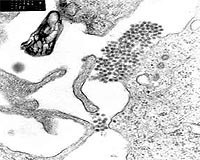 |
Paris (AFP) May 19, 2011 The Global Fund to Fight AIDS, Tuberculosis and Malaria warned Thursday it faced a shortfall of more than a billion dollars, threatening goals to roll back diseases that together claim more than four million lives a year. The Geneva-based Fund said it needed at least 13 billion dollars for 2011-2013 to cover minimum estimated needs, yet pledges from donor nations and private sources so far amounted to only 11.7 billion dollars. Its maximum needs for the three-year period could top 20 billion dollars, Global Fund Executive Director Michel Kazatchkine told a press conference in Paris. Without extra resources, the progress of new programmes will be "significantly slower" compared with previous years, he warned. "We need more if we are going to have a world in 2015 where nearly no one dies of malaria, no more children are born infected with HIV and at least 70 to 80 percent of patients who need treatment for AIDS get it," he said. Universal coverage with insecticide-treated nets in Africa to combat malaria, and the elimination of mother-to-child HIV transmission will now be more difficult to achieve, he added. Donations to the Fund have been undercut by the continuing fallout from the worldwide economic crisis that started in 2008. In addition, revelations that 34 million euros (25 million dollars) of dollars have gone missing from community programmes in four African nations have prompted Sweden and Germany to suspend donations until an audit is completed this year. Next month sees the 30th anniversary of AIDS, traced to the publication on June 5, 1981 of a report noting the first recorded deaths, initially among gay men in the United States. Since then, more than 25 million people have been killed, and more than 60 million infected by the human immunodeficiency virus (HIV) which causes the disease. Globally-mustered resources, however, have remained at under 16 billion dollars a year since late 2007. Created in 2002 with seed money from software mogul Bill Gates, the Fund accounted in 2009 for 20 percent of international public funding for HIV, 65 percent for TB and 65 percent for malaria. From 2002 through 2010, the Fund helped save 6.5 million lives, the report said. The report's release comes ahead of a meeting on May 26-27 of G20 nations in Deauville, France, where Kazatchkine said he would pitch for more funds. Emerging nations should also contribute, he added. "The world is changing, the G8 has become the G20. It is clear that emerging nations -- Brazil, China, India, South Africa and Mexico -- should become actors in this collective, international effort," he said. Last year, the Fund disbursed three billion dollars on AIDS, TB and malaria, the biggest single-year payout in its decade-long history. Some of that money went to the distribution of 56 million insecticide-treated nets, half as many as had been given out during the preceding eight-year period. Tuberculosis cases detected and treated in 2010 increased by 29 per cent, with an even higher increase -- almost 50 percent -- for so-called multidrug-resistant tuberculosis (MDR-TB). By the end of last year, programmes supported by the Fund were providing lifeline antriretroviral therapy to some three million people, a 20 percent increase over 2009. One million of those recipients were pregnant women living with HIV. The drugs helps block transmission of the virus to the foetus.
Share This Article With Planet Earth
Related Links Epidemics on Earth - Bird Flu, HIV/AIDS, Ebola
 Key West campaign against dengue fever
Key West campaign against dengue feverKey West, Fla. (UPI) May 18, 2011 Florida health officials say they've launched a public awareness campaign in an effort to prevent another outbreak of dengue fever in Key West. Dengue fever, which can be fatal, is transmitted through the bite of an infected female Aedes aegypti mosquito, the target of the current campaign, The Miami Herald reported Tuesday. "No bugs, no dengue," said Bob Eadie, administrator of ... read more |
|
| The content herein, unless otherwise known to be public domain, are Copyright 1995-2010 - SpaceDaily. AFP and UPI Wire Stories are copyright Agence France-Presse and United Press International. ESA Portal Reports are copyright European Space Agency. All NASA sourced material is public domain. Additional copyrights may apply in whole or part to other bona fide parties. Advertising does not imply endorsement,agreement or approval of any opinions, statements or information provided by SpaceDaily on any Web page published or hosted by SpaceDaily. Privacy Statement |